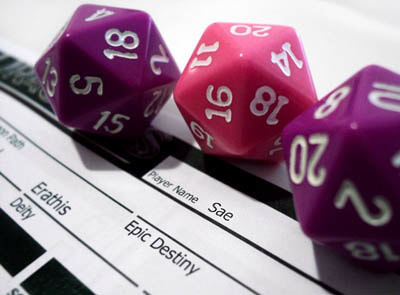|
Worlds teem with adventure. A framework built by a writer, organized by the game master, and the lived through by players. The player’s fate, in essence, the fate of the story, and the world within it are in the hands of imagination's role and the roll of a dice. This is the realm of Role Playing Games. I stumbled into doing freelance writing from meeting some of the Harsh Realities guys at a gaming convention. I had an interest in doing freelance work and getting published. After a few emails, I was able to start generating content, and now I am one of the lead writers for Elfwood. The following guest post has been submitted by Joe DeMarco of Word Art Online For many years, I was fascinated by the depth of stories and making up adventures in my head. But something was missing: how could I share these adventures with others? I started writing adventures while experiencing different genres of tabletop RPG games in college. Some were inspired by video games, others by going for a walk in downtown Lincoln. Character backgrounds I wrote for a modern campaign setting were often inspired by people I met and saw at renaissance faires. The ability to create a world, filled with characters and adventures, gave me a great sense of purpose and belonging. I now share that world with others, allowing them to explore what I created. This is the fun part of what I do. What are Role Playing Games? Role Playing Game (RPG) is a genre of gaming in which the player takes on a role and plays through the game's story. Digital game examples of RPG games are Fable, World of Warcraft, Elder Scrolls, Mass Effect, Dragon Age, and many others. Typically, in an RPG you create a character and enter the world. Some games have a narrow story line (the Final Fantasy series for example) you follow through to the end. The Elder Scrolls, Skyrim, and World of Warcraft games have different story lines you can interact with, but the order in which you interact with them are up to you. This is what makes an RPG attractive. Yet RPGs on the computer are restricted to the limitations of the developers and their abilities. In a tabletop RPG adventure, you are only limited by your imagination and the imagination of the storyteller. In many cases, the system rules will limit your abilities to do certain things. If your rules system or setting doesn’t have guns, then having a character who is proficient in guns won’t happen. Your character design will play a key element in the adventure. Also, how you play your character can also influence the grand scale of a story. For example, if you develop your character with a low intelligence but a high strength, he may be able to do a lot of damage when attacking. But when it comes to making skill checks, he may not be as good as other characters. Playing off the character traits like this while in an RPG adventure is an enjoyable time. What is it like writing Tabletop RPGs? I started writing adventures back with telling stories the players could go through. Some started off as small one shot adventures; others grew into massive campaign story arcs. It’s an adventure of its own coming up with creative stories and trying to focus on one adventure before another one pops into my head. One shot adventures are those that can be done with a strict time restraint. An hour time slot that you would have at a convention, is an example of a one shot adventure. In most cases, one shot adventures are limited to one story. The key difference between a one shot and a campaign is that in a one shot, the story is over at the end of a session.However, sometimes it may be a small part of a campaign or story arc. Campaigns are created with several sessions in mind. Some campaigns I’ve been on lasted over a year, with us meeting once a week before we finished the overall story. A larger campaign allows the player to be able to flesh out his character by how they interact with the world. Growth of character in a campaign is a fantastic way to explore one’s creative mind. Finding inspiration for adventures can also be found everywhere you go. I have found inspiration everywhere from the zoo to watching my son play. One game settings I am currently working on was inspired after going to renaissance faires and science fiction conventions. My projects have me writing an entire game world. Taking a framework built by the original writers, and providing narrative content to it. I have written many beasts with adventure in mind. What makes our dragons different and makes our RPG setting unique? How these creatures interact with the players? Yet, how the players will interact with these creatures is up to the players. While some of that comes through the written story and how the GM chooses to present the material, a player also needs the framework of the world. A Role Playing Game story can consist of many different themes and elements to the adventure. Similar to how a novel can have different themes throughout the development of the story, and in some cases from book to book. Suggestions for Writing Role Playing Games Writing a Role Playing Game (RPG) has a lot in common with writing in other media. Both start with a common idea or theme and are fleshed out as the story develops. One of the major differences is in the presentation of the material. In a novel, the writer writes from the point of view of the story presented to the readers. The story is revealed to the reader to guide the imagination forward. In RPGs, the writer has fleshed out a story and provided a framework for players to explore the world. He has given the Game Master (GM) resources to help tell the story. Being a GM is a difficult task with a lot of rules to remember, a story plot to follow, and characters to present. But ultimately the story can take many different turns; even some that the writer, or the GM, never planned on.
Caution should be stressed if you choose to play an adventure you wrote. This is a fun element to writing tabletop RPG adventures but you should be respectful of the GM if it is not you. They may put their own spin on the story, which may be different than what you had planned out. Don't worry. It is a natural occurrence as a GM. They want to make it just as much part of their own world and have fun with it as you do. Writing for tabletop Role Playing Games can be an exciting and challenging endeavor. Don’t try to plan for everything, but make sure to have enough information down so that the GM can run with what you have written.  Joe DeMarco, single father, aspiring writer and game designer, software tester. I am a writer on Elfwood, a seafaring campaign setting from Harsh Realities. I enjoy all aspects of writing and storytelling. I get my inspiration at renaissance faires, conventions, playing games with friends, and even from the adventures of watching my son play and craft his own stories through his imagination. |
Details
Categories
All
Archives
June 2023
|


 RSS Feed
RSS Feed